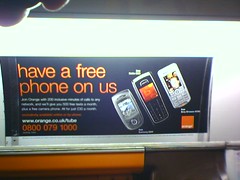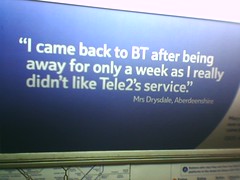Thursday, March 17, 2005
I'm presently finding a distinct lack of enthusiasm for writing my contribution to our global monthly product. I decided to trawl the analyst ratings pages on Bloomberg in search of something to spur me into action. I think I might have found it. I compiled 418 analyst ratings on 15 stocks (SBC, Verizon, BellSouth, Nextel, Vodafone, Deutsche Telekom, France Telecom, BT Group, Telefonica, NTT, KDDI, DoCoMo, SK Telecom, China Mobile, Telstra), and here's the split I got:
Positive 50%
Neutral 38%
Negative 12%
The MSCI World Telecom Index has underperformed the MSCI by 5.3% year-to-date. The power of positive thinking may be impotent.
The MVNO catfight in the UK is much more interesting than politics or soap operas. Today Easy Mobile issues a retort.
Last night I was sitting on the sofa, playing around with Skype, watching a bit of television, and generally being unproductive. I tormented myself by watching an interview with another sell-side telecom analyst who, when asked about VoIP, referred to a company I'd never heard of called "Sky-pee" (hey is it March 2005 or what?). I can only assume that said analyst may not have had any personal experience with Sky-pee, and I wonder generally what proportion of finance industry pundits have actually taken the time to consider the user experience before dismissing it as "kidstuff."
I then got pinged on Skype by a guy in our IT department who also uses it - or so I thought. It turned out to be his 17-year-old son, who was responding to my earlier unanswered IM, just to say, "This is xxxxx's son. My dad's asleep now." We had a brief chat, and then I wrote, "It's 11:00 PM and Jeremy Paxman has just appeared on my TV screen - that's my cue to go to bed." The reply was:
"Jeremy Paxman?"
The American equivalent of this when I was 17 would have been to say, "Who's Tom Snyder?" Inconceivable. He might as well have said, "What's broadcast TV?"
I paused. He responded, "Don't worry, I'll Google him."
We signed off, and I thought about the diverging worlds underlying all this convergence. Telcos, in your IPTV assault, make sure your focus groups are full of 17 year-olds. And analysts, get in the game.
Yet another groot-value reader just forwarded me a press release from UGCEurope, responding to the bombshell article in yesterday's Trouw. It's in Dutch, and there's no sign of it on either the UGCEurope website, or that of parent UnitedGlobalCom. The reader's translation is:
"UPC demands rectification of Trouw
UPC requires from Trouw a rectification of its statetement that UPC in the Netherlands in 2004 made a net profit of euro 200 million, or a profit of 87 euro per customer. The real tale is that UPC Netherlands made a loss of euro 50 million, or euro 20 per customer.
In the past years UPC in the Netherlands has invested some billions of euro and it will continue to invest hundreds of millions euro of in the Netherlands.
UPC asks Trouw to be more meticulous in the future with its financial and economic reporting.
UPC Netherlands are a consolidated subsidiary of UnitedGlobalCom Inc. (UGC)"
I understand that a couple of opposition parties in the Dutch parliament have asked awkward questions of the Economic Affairs Minister based on yesterday's article, and I also understand that Trouw today carries an article seeking to draw a contrast between UPC and a small regional MSO in Brabant, which publishes a breakdown of the cost of its services here. The total per home, including 19% VAT, is EUR10.50, and this MSO only has 2,600 customers, some of whom were not easy to reach. The implication seems to be that UPC, with a customer base nearly 1,000x greater, and much better clustering in its footprint, should be able to amortize costs more effectively given its scale, i.e., whatever the stated accounting profits might be, the cash costs should be well below those of Brabant.
I think what we are witnessing here is a journalist with a tiger by the tail, and an evermore politicized, maybe even nationalistic aspect to it, and I think we can expect the saga to run. It's worth remembering that the Dutch market has previously explored the course of mandatory unbundling of the cable plant, and I wonder if this mounting debate will revive calls for such action.
The future's...

They've drafted in Commander Data and a bunch of celebs for the TV spots (which frankly are some of the longest-feeling commercials I have ever watched), they seem to have contractd a huge amount of outdoor advertising (at least in South London where I live), and now Orange has moved into BOGOF territory. Why not a sixpack?
Wednesday, March 16, 2005
Big doings in Germany today, and more pressure for DT (beyond what shareholders may already be applying - the company's business plan shows 10-year dividend CAGR of only 9.4%, I was forecasting 14%, and their turnover and EBITDA projections are considerably more optimistic than mine).
Leading web portal Web.de and United Internet, the market's most aggressive alternative DSL player, have agreed an alliance and partial merger. The combined portal business should have considerably larger reach than T-Online itself, and the EUR200m cash injection into Web.de will fuel a more aggressive investment in internet telephony. I had Web.de in my model portfolio last year as a consolidation candidate. Nice to be right, but the timing was suspect...
I think I'm just going to turn this blog over to my readers, who are sending me some sterling stuff. Keep it up folks!
One mega-value reader alerts me to a survey in Norwegian paper Aftenposten, showing that half of Norwegian households currently have broadband, and most of the rest plan to migrate to broadband in the next 12 months. My reader also observes that, being election year in Norway, one opposition political party is calling for 6Mbps minimum to every home, as a matter of national policy, another good example of the politicization of broadband. Is it a product, or a public good?
An uber-value reader alerted me to Shift.tv, a project of German broadband media company TV1. I called CEO Michael Westphal at his booth at CeBIT, to learn more. My initial understanding is that Shift.tv is an internet-based PVR, which captures broadcast TV, encodes it as Windows Media 9, and transmits it to the end user at a bitrate of 450kbps. So we're really talking about something intially for the DSL and Wi-Fi user, but I'm curious to see what sort of iterations might develop around mobile in future.
It is currently in beta with c.20,000 users. Mr. Westphal described the trial as "overrun by demand," so much so that the number of channels on offer has been cut from 20 to seven (ARD, ZDF, RTL, RTL II,Pro7, Sat1, N24), and the number of new users limited, pending the arrival of some additional hardware. He noted that if Shift.tv were to just open the trial to all comers, new users would join at a rate of 1,500 per day, and the company wants to preserve the quality of user experience during this critical trial phase.
TV1 is paying copyright to content holders in just the way that VHS producers have done previously, and as the service is for personal use only, as far as I can see it is no different from a VHS recorder, except in terms of where the transaction is taking place. However, given the entertainment's steadfast belief that IP = internet piracy, I would expect that TV1 has its legal team braced for the inevitable challenge. I would also be surprised if Germany were the only European market where this business model is attempted.
Via a super-value reader, this interesting article appeared in today's Trouw newspaper in the Netherlands. In it the author concludes that the Dutch business (UPC) of John Malone's UnitedGlobalCom generated EUR200m in free cash in 2004, which he works out to be EUR7 per household per month, for a margin of 57% on the average subscription pre-VAT. The article goes on to quote a UGC spokesperson as saying that excess cash being generated by UPC in the Netherlands will fund acquisitions abroad, particularly in Europe. It's difficult to get too much of the nuance from the machine translation I have in front of me, but there is a pretty clear connection drawn between the price hikes of up to 50% for some homes, and the ambitions of "the American cable king" abroad. I get the sense that the message is "the Dutch consumer is subsidizing a foreign mogul to complete an empire." That's what capitalism is all about, but I think we're increasingly getting into murky water where the Dutch internet infrastructure is concerned. Is it any wonder that we see such euphoria when muni-fiber comes into the picture?
Tuesday, March 15, 2005
Sometimes I write on investor relations issues, when I see something I don't understand or find strange. This qualifies, and I can't think of any explanation why it should have happened this way, particularly in light of the track record of replays and archived webcasts. Weird.
UPDATE: Similar weirdness in Germany. Today is DT's analyst day at CeBIT. Faced with a complex array of commitments here, I opted not to go this year, confident that I would be able to view the full webcasts, which were available last year. Until I found out yesterday that the divisional presentations (i.e., the interesting bit) would not be webcast... Instead, we got the "vision" piece from Mr. Ricke, and an HR presentation in English with Q&A in German, with no audio channel on the web for simultaneous translation. Seems to me that an SEC-registered company would happily do live webcasts of anything remotely material to the financial outlook of the company. Still it's an effective way of filling up EUR600 per night hotel rooms in Hanover. I guess the brokers should be happy, because this sort of thing bolsters their position as links in the information chain to the investor.
UPDATE 2: It's now later in the day and I'm listening to NTL management discuss a set of financial results, which no one has seen yet. No press release has arrived, there is nothing on the website, and CEO Simon Duffy apologized in his opening remarks for the fact that "not everyone had the release." I assume "not everyone" means anyone outside the company. Apparently they have had some formatting problems.
FINAL UPDATE: The report finally arrived, and the slides were posted to the website, about 20 minutes into the call, i.e., after the management discussion had pretty much ended.
My cyber-freund Lars has been making some interesting observations on the plethora of new German VoIP forays and also the various emerging business cases (or lack thereof) for WiMAX over at Telcotrash. Worth the trip.
Martin's aim is rarely anything less than true, and he's given the cellcos one in the eye with this post. We spent some time riffing on this idea this morning on Skype. Flying to Barcelona? Why not take Easyjet? We can rent you a car when you get there. Already an Easy Mobile customer? How about a cheap roaming SIM? Spend more than EUR40 on airtime, and we'll give you airmiles, and the cross-marketing opportunities go on and on. Like Martin, I'm not at all convinced that the traditional networks are really equipped to play in this sort of landscape. The existing MVNO players were quick to point out weaknesses in the product offering (including no roaming capability - yet), but one has to question whether truly crap business strategies deserve such vociferous responses if they pose no threat.
Skam, revisited
In making this post last Friday, I'm getting the impression that I may have left myself open to misinterpretation, so here's an attempt to clarify. In relating my Massively Multi-user Skype Chat experience, I wasn't trying to besmirch the good name of Stuart, in any way, as I thought I made clear at the time. So to defuse the situation, let's take Stuart out and replace him with the fictional Mr. X. He's a Skype contact of mine, though I don't know him well, and I think we know some people in common. Other than this change of cast, let's keep all the other facts the same. The conclusion of my post was that I didn't feel there was an adequate mechanism for protecting myself from inclusion in such Mass Chats, but I didn't explain why clearly enough.
Obviously, I could tweak my privacy settings to shield me from all but those who know me, and I thought this would have been taken as a given in my original post. Anyone who wishes to establish contact must then seek authorization. Fine, but what if I use Skype precisely because I want to meet new contacts and friends? Moreover, what if I'm that small hotel in Switzerland, Jakarta, or any of the other businesses I've uncovered which apparently use Skype and want to maintain a visible, contactable presence? Keeping myself “safe” might cheapen the experience of Skype for me, and it still doesn’t solve some of my potential problems.
- Contextual presence – There may be times when I am happy to be drawn into a Mass Chat initiated by a contact, but there may be other times when it is intrusive. I currently have no control over this. Even if my presence indicates “do not disturb,” I have no opt out before the fact. Recall that in this example I am offline at the time, but end up being involved in it eight hours later, as the whole Mass Chat is cached in Mr. X’s client until we are both online again. “Lighten up,” I can hear you say. “My friends include me in a visible way on silly group emails all the time, and this is no different.” Actually, I can choose when, if ever, to open those emails, and also when, if ever, to open “reply to all” emails from the other people on the group list, in my own good time. What I want is something which allows me to set clearer rules. If I am displaying “do not disturb” and Stuart initiates a chat, interrupt me, if it’s Mr. X, defer. I’m sure this is in the works, but we’re not there yet, and if 49 other people are involved, my annoyance level may skyrocket if I am busy. I can always just exit, or shut Skype down until I am no longer busy, but the latter choice may be counterproductive if I am both busy and urgently awaiting contact from one specific person.
- Reputation – I know that Stuart has interesting friends and contacts, so I’m not worried, but in the case of Mr. X, I have to hope that his inclusion of his friends (some I may know/like, others not) will not bore me, offend me, or be indiscrete (spare a thought for the poor friends of Paris Hilton). Moreover, in principle I’m not sure I’m happy to have my identity exposed to people I don’t know. (It occurs to me that Skype might be able to charge for an “ex-directory” service for those who really want to be selective, but that doesn’t apply to me [before I am labelled an unsociable curmudgeon]). What would be nice is the ability to say, “If Mr. X initiates a Mass Chat which contains people not in my contacts list, exclude me.” Or perhaps, “Include me only if all the participants share at least one common contact with me,” or maybe something fuzzier like a probability ranking based on past contacts (maybe something akin to LOAF).
This is a complicated wish list, I know, and I’m not complaining. How annoyed can I be with something free that works as well as Skype does? My underlying point was that I was concerned that some of the communications functionality of Skype may be progressing faster than the users’ control mechanisms. As long as everyone plays responsibly, no one gets hurt, but we know this is not a reasonable expectation in the real world. Despite whatever impressions I may have given to the contrary, I’m actually laid back about these sorts of things (life is too short, and I have a day job to think about), but not everyone will be, and I was merely trying to ponder what happens if users begin to perceive Skype as another source of intrusion and annoyance, rather than as the liberating experience it can/should be.
UPDATE: I now see that Stuart has, as usual, some very interesting thoughts on this issue, well worth a read.
Monday, March 14, 2005
T-Online's Musicload subsidiary is reportedly contemplating legal P2P as a commercial strategy, according to Heise Online. What "the service has in mind" sounds a lot like Peer Impact, which would make sense, given the buy-in it has received from the labels. Knowing DT, I think it's probably better than even money that the service will be branded something like "T2T," or maybe "T for 2." Arguably, given the parlous state of the German economy, maybe DT would be better off partnering with someone like Weedshare, in the spirit of "geld ist konig."
A while back I posted on the halo effect of Skype, and today another example comes my way from Riaan, a very satisfied buyer of the ActionTec Skype "ATA." I like his final observation best of all.
UGC has just reported Q4 results, and the management overview makes reference to 55k VoIP users currently in the Netherlands and Hungary since product launch last October. We don't know how many they ended the year with, but in November they were guiding towards 15 - 20k. Assuming they hit that, then the current number implies that net adds are running at 3,600 per week, or thereabouts, so far this year. To put this in perspective, Carphone Warehouse's TalkTalk product adds around 9,000 per week, but in a much larger and broader addressable market (CPS in the UK [population >59m], vs. broadband in the Netherlands and Hungary [combined population c.26m]). Not huge numbers, but a respectable growth rate, and France launches later this month.
As of last Friday night, I am the proud owner of a SkypeIn phone number in area code 903. My parents in area code 901, still broadband refuseniks, can breathe easier knowing that BellSouth's super-value international dialling plan will be claiming a bit less of their hard-earned cash each month. The 45-minute call sounded great - in fact they seemed a little incredulous about the whole thing, but you can't argue with virtually free.
No one ever accused the telecom industry of having a great sense of humor, but it seems to be improving. Consider this jab at Easy Mobile (in fact Easy everything) from Carphone Warehouse's Fresh MVNO. If this carries on, someone's feelings are going to get hurt, though if it comes to a wrestling match, my money is on Stelios over Charles Dunstone (unless he sneaks a trophy into the ring).
Friday, March 11, 2005
A super-value reader points me toward an unusual situation up in Norway. NTV, a joint venture between the two leading terrestrial broadcasters and default recipient of the DTT multiplexes awarded in 2002, has asked for an extension of the license period from 12 to 15 years. This had the (probably unexpected and unwelcome) effect of prompting the regulator to open up the consultation process to allow other interested parties in, potentially leading to a beauty contest to reissue the license.
What's different now in 2005 is that DTT is no longer a speculative technology venture. Freeview in the UK has 5m households and is a source of frustration to pay TV players, and in Italy Mediaset is proving the pay-per-view model in a prepaid setting. Now Telecom Italia is co-opting DTT into its new DSL offering, and it will by no means be the last to do so. DTT is potentially a very valuable shortcut to market for telcos to deliver linear TV cheaply and easily, so they can concentrate on the on-demand services over DSL, as I have written before. I'll be very curious to see just how much of a strategic (and political) football (or snowball?) this turns out to be in Norway. Revenge is a dish best served cold...
Welcome euro tech news to the ever-expanding community of Eurocentric blogs. Author Steve used to work for Thus until they supersized his downsizing, and knows his stuff.
A couple of days back, I asked for some feedback from any fiber geeks as to their views on the OFCOM copper valuation exercise. I have received a lengthy reply from one such geek, who wishes to remain anonymous. It is eloquent and pointed, and I present it in its entirety:
I could not resist your call for reactions on the Analysys/Ofcom report (costing of copper) because the report first of all demonstrates the perverse symbiosis between regulator and incumbent, and secondly demonstrates that sight without vision is worse than being blind.
There are questions that are worthy of research because they extend our knowledge. On the other hand, there are questions that should be rejected violently because they actually are statements, cunningly hiding essential assumptions under an innocuous question mark. Leading questions with a predictable predetermined outcome.
Such is the case in this study.
Fiber to the home is not costed because it needs a CPE, and it does not give a lifeline solution for voice (in the day and age where mobile is replacing fixed voice and most homes have a DECT phone or PABX which would not work anyway if there is no power). The limitations of copper are a given limiting the services and the network model to existing paradigms.
An equivalent study in the 1800's would be to try to cost the service of transporting goods and people by stagecoach or horsedrawn boat in a canal by comparing it to the cost of a steam train transporting the same amount of goods and people over the same trajectory. As coal supply and water supply would be needed to fuel the train, it would not be considered because horses do not need this. The speeds and distances covered would not exceed an average of 20 km/h and a days travel, and the purpose considered would not exceed the existing use. Of course, it would be rejected.
Quite ridiculous as we very well know that the economic impact of the steam train, and the new services made affordable to the general public and the economy, have had such a major impact on society.
Why does OFCOM do not compare the cost of a unit of service between different solutions? If one would take the cost per month of 100Kbps of bandwidth (be it for voice (VOIP) or data, who cares) as a benchmark, one would very quickly see that a fiber solution would push down the price per100 kbps from Euro 4 per month to Euro 0,04 per month, a factor of 100 !!
Lets look at other hard facts.
A passive infrastructure for a POP based fiber network, with two fibers per home (supporting analog TV, digital TV, IP TV, voice, abundant Internet etc.) will cost (with conservative assumptions) only EUR7 a month per household in an urban environment.
The cost of electronics is dropping very fast with volume, and at the same time you get the ever-increasing performance of hardware, therefore hardware is not a big issue. We estimate that the integral costs plus profit margin for network operations including HW and SW for the active network will be around Euro 10 - 12 per month per connection. Meaning that you get for less than Euro 20 a month network with abundant capacity to be used by service providers for TV, telephone, Internet, Intranet, IP-TV, TV-Ondemand, DelayTV, Videotelephony etc.
It really makes me angry to see how these regulators in a very perverse way are becoming the protector of the status quo and the biggest barrier to a normal development of the market, meaning Schumpeters process of creative destruction.
I'm going to coin a phrase here, I think. Anyway, Skam = Skype spam. A friend received the following message yesterday (typos remain):
Dear friend, I represent a consulting company from Latvia. The company is
one of oldest in renewed Latvia. I have a proposal concerning legaly reducing
income taxes. You would be supprised about the results. Agents interesets are
appreciated.
This morning I opened up Skype to find that Stuart Henshall had initiated a group Skype chat for 46 people last night while I was offline, in order to discuss SkypeIn. The entire archive appeared in the client, and contained some interesting reactions, as well as some baffled ones. It seemed that some people were confused and perhaps vaguely resentful of being dragged into a group chat. Several exited immediately.
I certainly don't blame Stuart, because I like well-intentioned enthusiasm. But it made me start to think. Is it possible to repeat this process with people outside your contact list? I assume so, but I'm not going to try it. How about a Skambot, which indexes Skype users from the directory, enabling Skammers to set up unsolicited super-sized group chats like the benevolent one I experienced - but with the message being Latvian tax strategies, or worse. What defense do users dragged into this sort of thing have? How about unsolicited file transfers of advertising, porn clips, or worse? Remember, I wasn't online at the time the chat started, but still got all the messages when I booted up today. Yes, I have a right to exit, but do I have a right not to be brought into it in the first place? My feeling is that I don't, not at present anyway.
I love Skype as an application and a force for keeping the telcos awake at night. I admire the spirit of innovation which Skype is pursuing. I am amazed at all the activity being inspired around Skype. I am also a bit concerned that, as it gets bigger and better, it is also more attractive to those who have less noble intentions.
UPDATE: Now that this has apparently been picked up in a number of places, please see the followup post, which seeks to clarify and explain in more detail.
Just got an email saying so. I don't know if the carriers necessarily have a full view about what is happening. One I spoke to the other day told me confidently that only 80,000 people had ever given Skype any money. On-net traffic continues to top 42m per day on my observations, and should cross the 6bn minute mark sometime today US time, I think.
Thursday, March 10, 2005
Andy's on the case. I haven't heard anything about closed trials, as I did with voicemail, but whatever is happening, it looks as though they are laying the ground for the next wave in the service. Once they start selling numbers, the customer service issues many have noted with SkypeOut become much more critical if left unresolved. Perhaps the answer is in an outsourced Skype-enabled call center? Duh.
Blogger's been giving me a bit of grief today. Anyway, Stelios has done it again. GBP20 starter kit, 40% off headline call charges until June. Marginal users who are enduring breakage on GBP20 - 25 packages may like it.
Wednesday, March 09, 2005
A while back I posted on my concerns that the incumbents, desperate to get on the IP bandwagon and show that they are offsetting the decay in their domestic markets would seize upon VoIP as a new Holy Grail for capturing growth in adjacent markets, thus adding further market fragmentation and pricing pressure. Via Telcotrash, more evidence, a link to FT's Italian adventure.
UPDATE: We can now also add the UK to this post.
UK mega-hyper-uber-regulator OFCOM has published the commissioned Analysys report on costing the copper access network. A lot of detail has been excised from the cost comparison tables, which is frustrating. Analysys determines that the only worthy alternative technology (on its criteria), FTTC, is either marginally more or less expensive than copper, depending on how the primary cross-connects are configured. Wireless was not considered, so I'm not sure this represents "out-of-the-box" thinking (which it wasn't intended to be). Fiber geeks (I kow you're out there), I'd be interested in any insights you could share on how this study was structured and presented.
Swisscom has 6,000 Wi-Fi connections per day across the 170,000 room footprint of its Eurospot network, a 3.5% utilization rate, which is apparently something to get excited about. Elsewhere, and of much greater interest, is the Muniwireless annual report, just out. As usual, it is the definitive source for developments in this area and well worth a read.
A couple of days back we had an internal lunch for a few clients with BT Group IR. At one point in the discussion, BT remarked that its internal benchmarking showed KPN to be best-in-class in terms of taking out costs, and that attaining a similar performance has driven BT's own targets. Our own analysis of the incumbents in Europe has similarly shown KPN to be ahead of the pack in this regard, so this is hardly a surprising revelation.
Obviously, there's more to cutting costs than merely cutting jobs, but engaging in some crude spreadsheet play, to get BT up to a comparable level of EBITDA per employee (in EUR), I have to cut the workforce by more than 50%. That's to get where KPN is today, but let's remember that KPN last week announced up to 28% incremental headcount reduction over the next five years, and I would be surprised if it stopped there.
This is not a shot at BT, nor is it a definitive statement of its cost-cutting capabilities. Rather it is an open question to the industry - how small is small enough? This is a question which I don't believe anyone is really positioned to honestly answer, at least in public. The answer relies on some visibility of what the ultimate role of the telco will be, and that's when people start tugging at their collars and getting irritable.
One thing I noted from the Microsoft webcast which I linked to in my previous post was Bill Gates' response to the question (my paraphrase), "What is to prevent you from taking minutes of traffic or market share away from your traditional partners?" BG reiterated that partnering still remains important for Microsoft, because there are elements of the service offering which Microsoft cannot do itself. However, the one and only item he actually mentioned by name was connectivity. I think that's called damning with faint praise.
VoIP euphoria continues on both sides of the Atlantic, but Richard Stastny gives us a much-needed reality check with this post on Microsoft's RTC initiative. Contextual presence and identity management, device neutrality, firewall traversal, platform-neutrality in IM, integration with Outlook. This is not merely an attempt to recreate traditional telephony in an IP skin, rather, it is an acknowledgement of the increasingly eclectic nature of communications behavior. Clearly this is enterprise-focused in its first iteration, but it would be silly to expect that the consumer space will remain unaffected. As one highly valued reader in industry recently wrote to me, "While we are doing a decent job at keeping our eyes on the ball I am increasingly concerned that the end-users are already off playing something else than ball..."
UPDATE: Ahem...
Tuesday, March 08, 2005
ITSPA Parliamentary reception

Tonight I attended the Parliamentary reception for the Internet Telephony Service Providers Association (ITSPA) of the UK. There were around 100 people present, mainly from industry (as well as a few journalists). As usual, there were no sell-side analysts present, a trend I have noticed where any remotely interesting issue is involved.
There were a few short speeches, of which the gists were thus:
Claire Hobson of DTI: DTI is very positive on VoIP in terms of the benefits it may offer consumers and business. With UK broadband availability now among the highest in the G7, DTI views VoIP as another important catalyst for broadband adoption.
Andrew Heaney of OFCOM: OFCOM views this as the start of a fruitful relationship between itself and the new voice service providers. The ITSPA has engaged with OFCOM proactively to identify key issues and then drill down into the detail as regards policy implications. The ITSPA has also played a key role in identifying issues relating to consumer protection, and its code of practice serves as an important complement and extension to OFCOM's own stance on new voice services.
Kim Thesiger of Gossiptel highlighted the fact that, as recently as a year ago, the industry possessed abundant enthusiasm but no coordination in either operational or policy areas. The industry is characterized by intense innovation and cross-pollenation between telecom and internet, and ensuring that this nascent industry has a chance to compete fairly is key.
Eli Katz of XConnect lamented the fact that, while broadband availability in the UK may indeed be relatively high, UK voice-over-broadband users account for only round 10 - 15k of the estimated total (ex-Skype) 10m user base. It is imperative that the UK maintain a position in this area commensurate with its place in broadband.
I met a few interesting new people, and touched base with a few familiar others. One thing I noticed was that AOL's representation was somewhat larger than that of any other single organization...
Business Week has done a short piece on Peerio, which will probably do a lot to increase awareness about what Popular Telephony is about. There's not a lot of new information here, but two points did stick out. Firstly, boutique investment bank IFEX is reported to be trialling it in their European offices, and Commoca's COO alludes to strong interest from industry verticals like hotels and hospitals.
Totally off-topic, but today, in doing some research on Vivendi Universal, I naively typed in the URL www.nbcuniversal.com into my browser, thinking it would take me to the joint venture company set up by VU and GE. Instead, I learned that global media consolidation is the precursor to an invasion of North Korea. Now it all makes sense!
Sell telecom, buy Viacom
Monday, March 07, 2005
Popular Telephony is today to announce another China deal, this time with UpTech, which will integrate Peerio into a number of its devices and applications, which stretch into the mobility arena as well. This company has some interesting financial backers, and also a partnership with Siemens.
The Office of the Telecommunications Adjudicator has issued another update on LLU progress, with some fairly ugly charts here.
Global IP Sound has announced a version of its Voice Engine for Symbian. Symbian means Nokia, effectively, and this is hardly surprising, given the shockwaves from Motorola/Skype. However, what I am struck by is the increasingly short innovation/announcement cycle.
My observations show Skype volumes at 44m minutes per day over the weekend, and downloads at 571k per day.
This article on online poker in today's Financial Times highlights another area where the integration of Skype (or something like it) could play an important role in enriching the user experience of online activities which are already well-established. Notice that the ESPN site, which has reportedly generated intense interest, recommends, but does not require, a sound card. UK betting site GoldBet makes no mention of sound at all. If what these services are trying to associate themselves with, either explicitly or implicitly, is the "glamor" and psychological drama of professional gambling, then certainly a bit of witty banter around the table couldn't hurt the atmosphere.
Elsewhere, the Frankfurter Allgemeine is reporting that T-Mobile is to introduce flat rate data pricing at CeBIT later this week. The article, run through the Google translation tool with the usual comical results, includes a statement from CEO Rene Obermann that wireless VoIP as a mass market phenomenon is a non-starter for the next two to three years, after which DT will join the fray. I tend to think that events will conspire to collapse that timetable.
Thursday, March 03, 2005
Whatever investors might think about Tele2 from the standpoint of divisional reporting, the company certainly holds nothing back when it comes to its regulatory lobbying agenda. The newly updated 2005 report is available here.
Skype and Wi-Fi managed services provider Broadreach are to offer free Wi-Fi access to Skype users in Broadreach locations in the UK. These include some very high traffic (the company estimates 1bn annual footfall) and well-recognized locations, including Virgin Megastores, Eurostar, Travelodge, Moto, Little Chef, Virgin Trains, EAT, Choice Hotels & Quality Inn, and major railway stations including all London terminals.
On a separate note, I have resolved to follow Skype traffic more closely, and my observation today is that average minutes per day are at 41.3m in the past three day period. This is up from 40.3m observed this time last week.
Wednesday, March 02, 2005
I was actually at home in bed with stomach flu yesterday when KPN reported Q4 results, the first time I have ever missed a set of numbers because of illness. I probably wasn't the only one feeling queasy. Outgoing voice minutes per line were 8% lower year-on-year in Q4, and 23% lower than Q4 2002, and line loss ran at over 3% annualized. The company is planning to lay off up to 8,000 over the next five years, that's 28% of the total workforce (this reminds me of one of my elder daughter's favorite stories, Matilda, in which the evil headmistress says that her idea of the perfect school is one with no children) - and what's really worrying is that KPN was already among the most productive telcos in Europe. IPTV, DVB-T, VoIP, all catchwords used thousands of times in yesterday's analyst presentation, and undoubtedly the right thing to be talking about at this point. Yet the share price is down over 1% today in a flattish market...
Those tireless free networking exponents in London have produced an updated node map for view here. Obviously, there are a lot of nodes which are yet to be populated. Note that the developers are trying to put the nodes into some sort of local context, and to encourage others to make contributions, wiki-style.
A test download of Voipster is available for download. This company has been largely avoiding the VoIP spotlight since I wrote about them last summer, though they haven't been idle. Some unannounced carrier deployments are ongoing, and the company is pursuing partnerships with ISPs and portals, as well as some interesting developments in various market verticals. I made a test call today with Voipster management (the current version supports conference calling for up to 10 persons) and it sounded great. Apparently the company replaced the GIPS codec they were using with their own, which reportedly handles upstream bandwidth of as little as 22kbps. This is related to the harsh bandwidth demands of some of the markets where they are looking at doing deployments. Only Windows 2000 and XP are supported currently, but the company should release CE and MAC versions in coming weeks.






